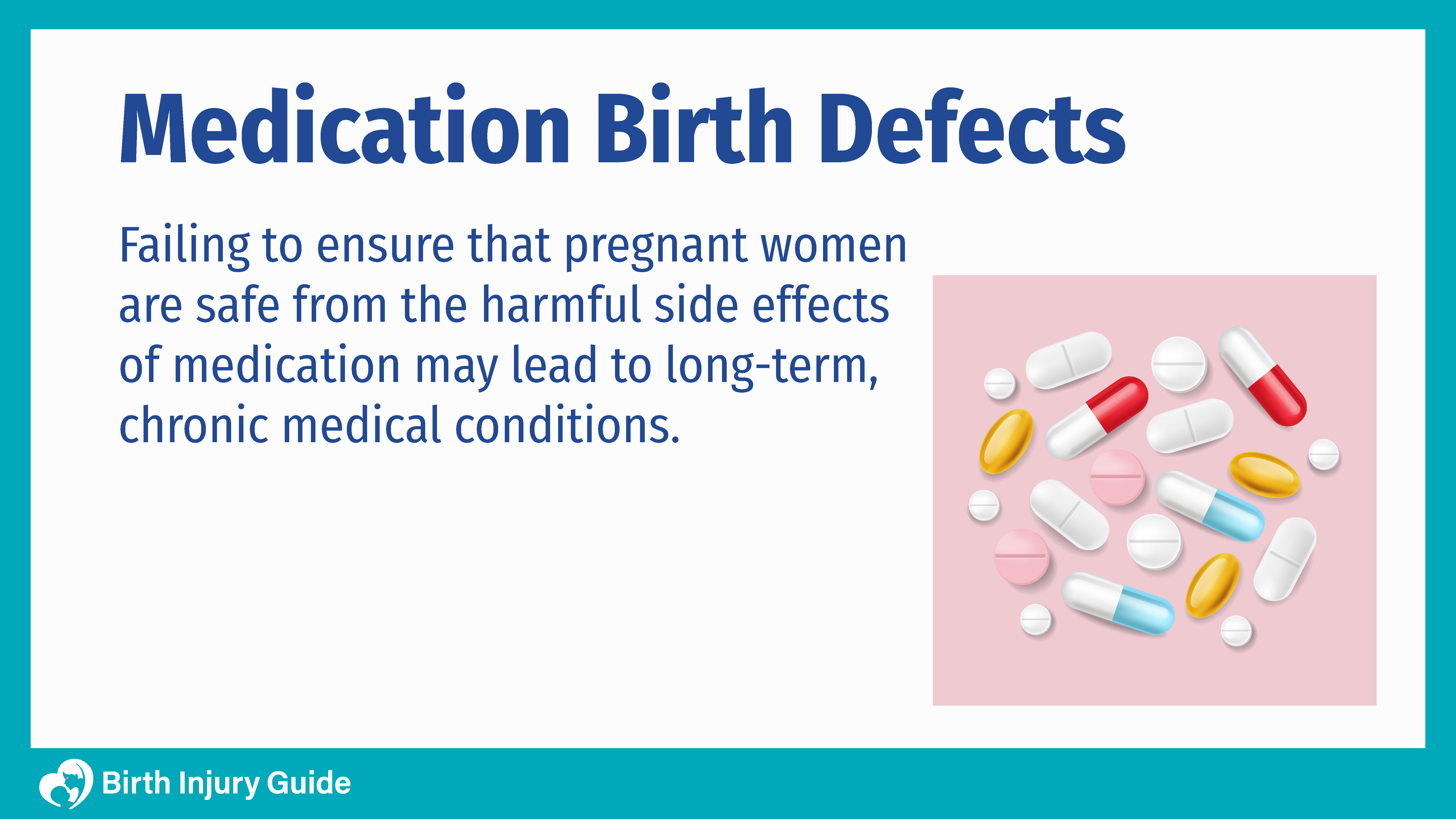
Medication Birth Defects
Although birth injuries and defects caused by alcohol and drugs are well-known in the United States, there are also prescription-based medications that have been linked with serious infant health risks if taken while pregnant or breastfeeding. Medication birth defects can have a tremendous impact on your family. Read on to learn more about the medications that may cause birth defects and what you can do to protect your pregnancy and the health of you and your infant.
What are Medication Birth Defects?
Many medications are considered safe during pregnancy, and many others come with a lengthy list of possible side effects. In either case, physicians have the responsibility to ensure prescribed medication is absolutely necessary.

What Medications May Cause Birth Defects?
Some of the medications that are linked to birth defects include:
SSRI Medications
Selective serotonin reuptake inhibitors, more commonly known as SSRIs, are typically prescribed for depression and anxiety. Physicians have been prescribing certain SSRI medications to women for years, but in 2006, the U.S. Food and Drug Administration (FDA) released a public warning stating that infants are at a heightened risk of developing persistent pulmonary hypertension of the newborn (PPHN) if exposed to certain SSRI medications in utero, including:
- Lexapro
- Celexa
- Zoloft
- Prozac
- Paxil
- Symbyax
- Fluvoxamine
SSRI Birth Defects
In addition to PPHN, SSRI medications may also cause:
- Limb abnormalities
- Cleft lip and/or palate
- Heart defects
- Spina Bifida
- Craniosynostosis
- Neural tube defects
- Omphalocele
Although SSRI medications are some of the most widely-used medications that may cause birth defects, there are many other medications linked to infant medical issues.
Benzodiazepines
Benzodiazepines are a class of drugs that are used to treat a range of medical conditions. They are typically prescribed for muscle relaxation, anxiety disorders, insomnia, seizures and panic attacks. Often called ‘benzos’, this class of drugs works by altering the neurotransmitters that trigger anxiety or stress reactions.
While generally considered safe and effective, if taken while pregnant, certain benzodiazepine medications may cause birth defects or birth injuries. Some of the most commonly-prescribed benzodiazepines include:
- Diazepam (Valium)
- Oxazepam (Serax)
- Lorazepam (Ativan)
- Alprazolam (Xanax)
- Clonazepam (Klonopin)
- Triazolam (Halcion)
- Temazepam (Restoril)
These medications are effective at treating certain neurological conditions, but they do have possible side effects.
Benzodiazepine Birth Defects
Benzodiazepines have been linked birth defects or injuries, including:
- Esophageal atresia/stenosis (esophagus does not develop properly)
- Gastroschisis (the infant’s intestines are outside the body)
- Atrioventricular septal defect (holes between the chambers of the heart)
- Pulmonary valve stenosis (narrowing of the pulmonary valve slowing blood flow)
- Poor muscle control
- Cleft lip and palate
- Breathing difficulties
- Problems with temperature regulation
There is conflicting research about benzodiazepines and an increased risk of birth defects. Ultimately, discuss your concerns about birth defects with your doctor before changing or stopping any medication.
Antibiotics
Antibiotics are among the most-prescribed medications in the United States. These drugs treat a variety of bacterial infections, including bladder and kidney infections, strep throat and bacterial pneumonia.
Several antibiotics are safe to take during pregnancy, but emerging research suggests that some may lead to an increase in the risk for birth defects. Specifically, the class of antibiotics that includes erythromycin, clarithromycin and azithromycin has been linked in at least one study to increased risk of birth defects and miscarriage. This class of antibiotics is called macrolide antibiotics.
Antibiotic Birth Defects
The class of macrolide antibiotics may increase the risk of birth defects by as much as 55 percent, according to research. This class of antibiotics has been linked to:
- Cardiovascular malformations
- Major birth defects involving:
- Nervous system
- Gastrointestinal tract
- Genital development
- Urinary system
Other classes of antibiotics may also cause birth defects, including the following classes:
- Nitrofurantoins
- Sulfonamides
- Tetracyclines
These are linked to:
- Anencephaly (malformation of the infant’s skull and brain)
- Heart defects
- Eye defects
- Improper tooth and bone development
- Cleft lip
Accutane
is a form of Vitamin A that patients often use to treat acne. It is the original brand name for the drug isotretinoin. Accutane is no longer available, but there are other brands of isotretinoin still available in the United States, including:
- Absorica
- Claravis
- Myorisan
- Zenatane
Isotretinoin has been linked to severe infant birth defects, and in some instances, infant death. According to the FDA, 25-35 percent of pregnant women who take Accutane will have an infant with birth defects.
The birth defects that have been linked to isotretinoin include:
- Cleft palate
- Congenital heart defects
- Ear problems
- Eye problems
- Microcephaly
- Issues with the thymus gland
- Issues with the parathyroid gland
Doctors recommend women who take isotretinoin and become pregnant talk to their healthcare provider right away. It may not be safe to continue taking this medication during pregnancy.
Diflucan
Diflucan, or fluconazole, is a prescription antifungal medication that doctors may prescribe for yeast infections. Doctors may prescribe it during pregnancy because hormonal changes can cause a buildup of Candida, the type of yeast that causes yeast infections. Yeast infections occur in around 10 percent of pregnancies, and Diflucan or fluconazole are generally only an option if antifungal creams do not work.
Research shows, however, that taking Diflucan or fluconazole during pregnancy may increase the risk of miscarriage and certain birth defects.
Diflucan Birth Defects
Women who take more than 150 milligrams are also at an increased risk of having a baby with heart defects.
Primarily, the risk of birth defects or miscarriage are among women who have taken Diflucan or fluconazole for an extended period of time, especially during the first trimester. The U.S. Food and Drug Administration (FDA) says that long-term high-doses during the first trimester may be associated “with a rare and distinct set of birth defects in infants.”
NSAIDs
Non-steroidal anti-inflammatory drugs, or NSAIDs, are medications that promote healing, provide pain relief and reduce fevers. NSAIDs are very common in both over-the-counter and prescription medications. The most common forms of NSAIDs are over-the-counter medications such as:
- Aspirin
- Ibuprofen (Advil, Motrin)
- Aleve
- Excedrin
Prescription-based NSAIDs include:
- Diclofenac
- Etodolac
- Lodine
- Meloxicam
- Daypro
NSAID Birth Defects
NSAIDs are linked to a small risk of birth defects, including neural tube defects, limb abnormalities, microphthalmia and others. Although the risks of birth defects are small, be certain to talk to your physician before taking NSAIDs. Your doctor may recommend safer alternatives, such as Tylenol (acetaminophen).
Zofran
Zofran (ondansetron) is a prescription medication that was used for years to treat severe nausea and vomiting. Ondansetron works by blocking chemicals in the body responsible for nausea and vomiting. Doctors most often prescribed Zofran to individuals undergoing chemotherapy, who had recently undergone surgery or who were suffering from nausea, including pregnant women. Pregnant women experiencing severe symptoms of morning sickness often take anti-nausea medication during the first trimester.
It is important to note that Zofran is a brand name. Patients may take ondansetron that is not “Zofran”. In 2007, the FDA began approving generic versions of Zofran. Though the name was different, the primary ingredient – ondansetron – was the same. More than 50 generic versions of Zofran have been approved by the FDA.
Although Zofran has shown effectiveness in treating nausea and vomiting, studies indicate that it also comes with a risk of side effects to both mother and infant. What’s more, the U.S. Food and Drug Administration (FDA) has not approved this medication for use during pregnancy.
Zofran in Pregnancy
Several studies suggest that taking Zofran while pregnant can potentially lead to birth defects. Since morning sickness is most common during the first trimester of pregnancy, women taking Zofran do so during an infant’s most crucial development period. The types of birth defects that may result from Zofran or ondansetron use include:
- Cleft Palate – Cleft lip and palate occur as a result of an incomplete formation of the front of the upper jaw and upper portion of the roof of the mouth.
- Atrial Septal Defect (ASD) – ASD occurs when the wall between the two upper heart chambers fails to fully close. Because of the incomplete closure between the two chambers, the infant is born with a gap in the heart. This “hole” could take multiple surgeries to repair and can lead to long term effects due to poor pumping of the heart, and thus, the heart working too hard.
- Ventricular Septal Defect (VSD) – VSD is similar to ASD except that the lower two heart chambers experience an incomplete closure of the wall.
Because of the controversial side effects of Zofran and ondansetron, researchers continue to study and gather more substantial results. Some research suggests that cardiac birth defects are not common if ondansetron is taken during the first trimester. Research is ongoing.
Seizure Medications
Pregnant women who experience seizures are in a difficult position. Many of the popular medications that help control seizures may cause serious birth defects. This is a scary proposition for women who have epilepsy and who plan to become pregnant or are pregnant because seizures can cause miscarriage.
Seizure Medication Birth Defects
According to research performed by the American Academy of Neurology, the medications Tegretol, Depakote, Lamictal and Dilantin have been associated with an increased risk of infants developing:
- Developmental delays in walking and speech
- Organ deformities
- Cleft lip and/or palate
- Craniofacial defects
- Hypoplasia
Additional Tips and Information
It’s important to note that physicians have the legal obligation and medical duty not to provide patients medication that may increase the chances of infant birth defects. However, if you have any questions or concerns, make sure to speak with your physician immediately before taking any drugs, whether prescribed or over-the-counter. For additional information and resources regarding medication and pregnancy, contact the Centers for Disease Control and Prevention (CDC) at 800-CDC-INFO (800-232-4636).
Sources:
- http://www.cdc.gov/features/MedicationsPregnancy/
- http://www.cdc.gov/pregnancy/meds/index.html
- http://health.usnews.com/health-news/family-health/womens-health/articles/2009/11/02/cdc-study-links-2-antibiotics-to-birth-defects
- http://www.medscape.com/viewarticle/760804
- https://www.cnn.com/2018/12/18/health/morning-sickness-pill-birth-defects-study/index.html
- https://www.cdc.gov/ncbddd/birthdefects/features/kf-ondansetron-and-birth-defects.html
- https://www.ncbi.nlm.nih.gov/pmc/articles/PMC6669077/
- https://onlinelibrary.wiley.com/doi/abs/10.1002/bdr2.1497
- https://www.webmd.com/a-to-z-guides/what-are-antibiotics#1
- https://www.reuters.com/article/us-health-pregnancy-antibiotics/common-antibiotics-tied-to-miscarriages-may-also-lead-to-birth-defects-idUSKBN20T2QS
- https://www.cidrap.umn.edu/news-perspective/2019/02/antifungal-drug-during-pregnancy-tied-miscarriage-birth-defects



